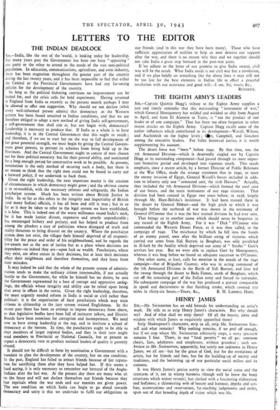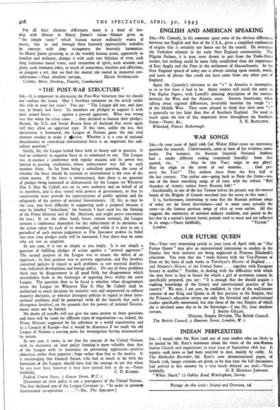HENRY JAMES
Snt,—Mr. Swinnerton has an odd formula for understanding an artist's work. He tells us to strip Henry James's characters. But why should we? And of what shall we strip them? Of all the beauty, jokes and wisdom with which James so exquisitely apparelled them?
Strip Shakespeare's characters, strip us all, strip Mr. Swinnerton him- self and what remains? Why nothing remains, if we peel off enough, but if we stop where Mr. Swinnerton arbitrarily stops, a sorry spectacle remains I fear. There, in our " fatal poverty" we all go: common cheats, liars, adulterers and simpletons, without grandeur ; such un- known to Mr. Swinnerton, apparently, but surely not unknown to Henry James, we all are--but for the grace of God, but for the revelations of artists, but for friends and foes, but for the building-up of society and traditions, and the bolstering up of our particular social milieu and its customs.
It was Henry James's genius surely to view the social scene and the creatures of it, not in wintry bareness (though well he knew the bony structures which winter reveals), but clothed with a fascinating elaboration and leafyness; a shimmering web of beauty and humour, depths and sur- face, accentuation and reservations, far-reaching judgements and order, spun out of that brooding depth of vision which was his. For all their absolute differences there is a kind of kin- ship with Mozart in Henry James's vision—Mozart gives us " the simple tunes" which human nature ordinarily wants of music, but in and through these humanly approachable melodies he conveys with deep strangeness the heavenly harmonies. So Henry James picturing to us the worldly human scene, apparently so familiar and ordinary, charges it with such rare felicities of view, such long luminous moral vistas, such researches of spirit, such wisdom and piety, such immense jokes, so much of conscience, loyalties and affections, so pungent a wit, that we find the mortal tale rooted in immortal con-























 Previous page
Previous page